Blog - Foot Doctor, Chambersburg and McConnellsburg, PA
What Causes Morton’s Neuroma?
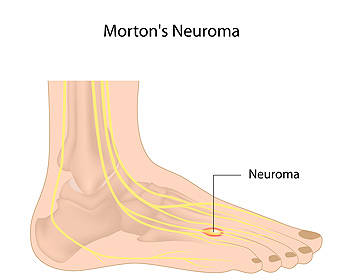 If you have a condition that is known as Morton’s neuroma, you may notice pain in the ball of the foot. This may be a result of an irritated nerve that has become enlarged, and may occur between the third and fourth toes. Patients who are afflicted with this condition may notice a burning sensation in the sole of the foot, in addition to the toes possibly becoming numb. A common reason why Morton’s neuroma may develop may include wearing shoes that are too tight, or choosing footwear that does not provide adequate room for the toes to move freely in. This may cause pressure to be exerted on the nerves in the toes, which may cause pain and discomfort. Existing medical conditions may precede the development of Morton’s neuroma, and these may include bunions, hammertoes, or flat feet. Mild relief may be found in resting the foot, and performing gentle stretching exercises. If you have symptoms of this condition, it is advised that you consult with a podiatrist who can properly treat Morton’s neuroma.
If you have a condition that is known as Morton’s neuroma, you may notice pain in the ball of the foot. This may be a result of an irritated nerve that has become enlarged, and may occur between the third and fourth toes. Patients who are afflicted with this condition may notice a burning sensation in the sole of the foot, in addition to the toes possibly becoming numb. A common reason why Morton’s neuroma may develop may include wearing shoes that are too tight, or choosing footwear that does not provide adequate room for the toes to move freely in. This may cause pressure to be exerted on the nerves in the toes, which may cause pain and discomfort. Existing medical conditions may precede the development of Morton’s neuroma, and these may include bunions, hammertoes, or flat feet. Mild relief may be found in resting the foot, and performing gentle stretching exercises. If you have symptoms of this condition, it is advised that you consult with a podiatrist who can properly treat Morton’s neuroma.
Morton’s neuroma is a very uncomfortable condition to live with. If you think you have Morton’s neuroma, contact Dr. Steven Schwartz of Pennsylvania. Our doctor will attend to all of your foot care needs and answer any of your related questions.
Morton’s Neuroma
Morton's neuroma is a painful foot condition that commonly affects the areas between the second and third or third and fourth toe, although other areas of the foot are also susceptible. Morton’s neuroma is caused by an inflamed nerve in the foot that is being squeezed and aggravated by surrounding bones.
What Increases the Chances of Having Morton’s Neuroma?
- Ill-fitting high heels or shoes that add pressure to the toe or foot
- Jogging, running or any sport that involves constant impact to the foot
- Flat feet, bunions, and any other foot deformities
Morton’s neuroma is a very treatable condition. Orthotics and shoe inserts can often be used to alleviate the pain on the forefront of the feet. In more severe cases, corticosteroids can also be prescribed. In order to figure out the best treatment for your neuroma, it’s recommended to seek the care of a podiatrist who can diagnose your condition and provide different treatment options.
If you have any questions, please feel free to contact our offices located in Chambersburg, and Mcconnellsburg, PA . We offer the newest diagnostic and treatment technologies for all your foot care needs.
Are Bunions a Deformity?
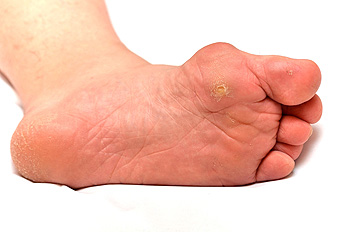 If you have developed a bunion, you may be aware of a structural deformity of the foot. It is considered to be a bone disorder, and affects the big toe. Obvious symptoms that may accompany this condition can include a bony protrusion on the side of the big toe, pain and discomfort, and possibly limited mobility of the affected toe. Bunions typically cause the big toe to move toward the toe next to it, and this is the reason for the joint to extend outward. There are several reasons why bunions may occur, and these may include genetic traits, medical conditions such as arthritis, or foot injuries that may have happened. There are specific foot issues, which may develop as a result of having a bunion, including hammertoe, bursitis, or calluses. It is important to be under the care of a podiatrist who can properly diagnosis this condition, and offer correct treatment techniques.
If you have developed a bunion, you may be aware of a structural deformity of the foot. It is considered to be a bone disorder, and affects the big toe. Obvious symptoms that may accompany this condition can include a bony protrusion on the side of the big toe, pain and discomfort, and possibly limited mobility of the affected toe. Bunions typically cause the big toe to move toward the toe next to it, and this is the reason for the joint to extend outward. There are several reasons why bunions may occur, and these may include genetic traits, medical conditions such as arthritis, or foot injuries that may have happened. There are specific foot issues, which may develop as a result of having a bunion, including hammertoe, bursitis, or calluses. It is important to be under the care of a podiatrist who can properly diagnosis this condition, and offer correct treatment techniques.
If you are suffering from bunions, contact Dr. Steven Schwartz of Pennsylvania. Our doctor can provide the care you need to keep you pain-free and on your feet.
What Is a Bunion?
A bunion is formed of swollen tissue or an enlargement of boney growth, usually located at the base joint of the toe that connects to the foot. The swelling occurs due to the bones in the big toe shifting inward, which impacts the other toes of the foot. This causes the area around the base of the big toe to become inflamed and painful.
Why Do Bunions Form?
Genetics – Susceptibility to bunions are often hereditary
Stress on the feet – Poorly fitted and uncomfortable footwear that places stress on feet, such as heels, can worsen existing bunions
How Are Bunions Diagnosed?
Doctors often perform two tests – blood tests and x-rays – when trying to diagnose bunions, especially in the early stages of development. Blood tests help determine if the foot pain is being caused by something else, such as arthritis, while x-rays provide a clear picture of your bone structure to your doctor.
How Are Bunions Treated?
- Refrain from wearing heels or similar shoes that cause discomfort
- Select wider shoes that can provide more comfort and reduce pain
- Anti-inflammatory and pain management drugs
- Orthotics or foot inserts
- Surgery
If you have any questions, please feel free to contact our offices located in Chambersburg, and Mcconnellsburg, PA . We offer the newest diagnostic and treatment technologies for all your foot care needs.
Identifying What Your Heel Pain Means
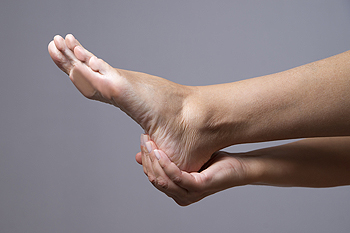 Heel pain is usually felt under the heel or behind it. There are various conditions that can cause heel pain, and the location of the pain is indicative of what the specific condition could be. One common cause of heel pain is plantar fasciitis, which is inflammation of the plantar fascia-tissue that runs from the heel bone to the ball of the foot. Plantar fasciitis is usually caused by either high or low arches. Sever’s disease only affects children, usually between the ages of 7 and 15 years old, and is caused by overuse of the growth plates in the heel bone. This condition typically affects children that play sports because of the repetitive impact that the foot endures. These are just two of the many possible conditions that cause heel pain. If you have regular heel pain, it is strongly recommended you speak with a podiatrist to learn about the condition and receive the proper treatment.
Heel pain is usually felt under the heel or behind it. There are various conditions that can cause heel pain, and the location of the pain is indicative of what the specific condition could be. One common cause of heel pain is plantar fasciitis, which is inflammation of the plantar fascia-tissue that runs from the heel bone to the ball of the foot. Plantar fasciitis is usually caused by either high or low arches. Sever’s disease only affects children, usually between the ages of 7 and 15 years old, and is caused by overuse of the growth plates in the heel bone. This condition typically affects children that play sports because of the repetitive impact that the foot endures. These are just two of the many possible conditions that cause heel pain. If you have regular heel pain, it is strongly recommended you speak with a podiatrist to learn about the condition and receive the proper treatment.
Many people suffer from bouts of heel pain. For more information, contact Dr. Steven Schwartz of Pennsylvania. Our doctor can provide the care you need to keep you pain-free and on your feet.
Causes of Heel Pain
Heel pain is often associated with plantar fasciitis. The plantar fascia is a band of tissues that extends along the bottom of the foot. A rip or tear in this ligament can cause inflammation of the tissue.
Achilles tendonitis is another cause of heel pain. Inflammation of the Achilles tendon will cause pain from fractures and muscle tearing. Lack of flexibility is also another symptom.
Heel spurs are another cause of pain. When the tissues of the plantar fascia undergo a great deal of stress, it can lead to ligament separation from the heel bone, causing heel spurs.
Why Might Heel Pain Occur?
- Wearing ill-fitting shoes
- Wearing non-supportive shoes
- Weight change
- Excessive running
Treatments
Heel pain should be treated as soon as possible for immediate results. Keeping your feet in a stress-free environment will help. If you suffer from Achilles tendonitis or plantar fasciitis, applying ice will reduce the swelling. Stretching before an exercise like running will help the muscles. Using all these tips will help make heel pain a condition of the past.
If you have any questions please contact our offices located in Chambersburg, and Mcconnellsburg, PA . We offer the newest diagnostic and treatment technologies for all your foot and ankle needs.
The Importance of Resting a Sprained Ankle
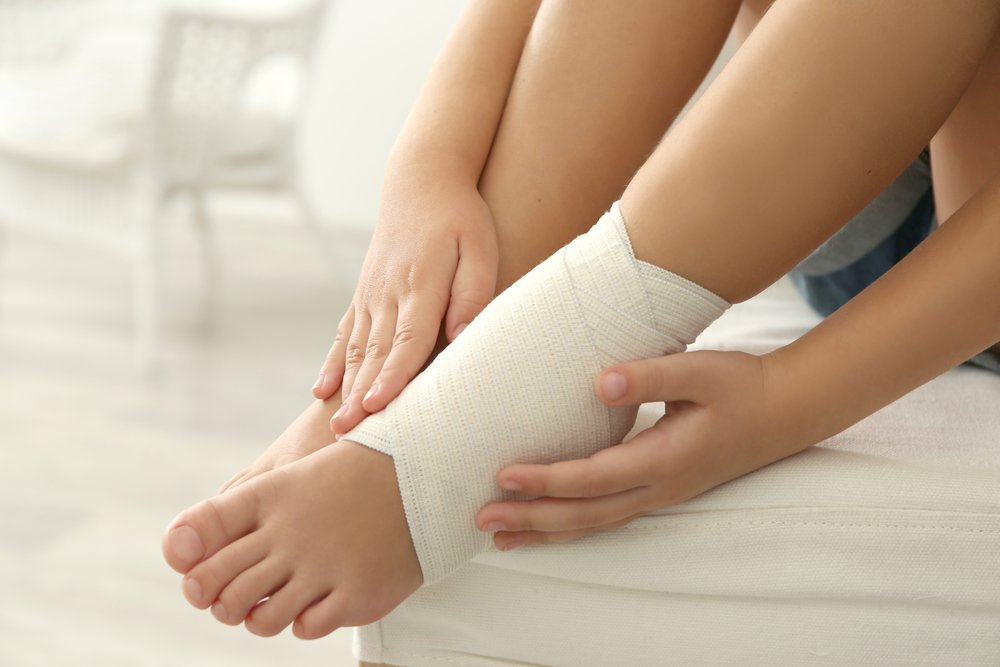 If you have fallen or twisted your foot, you may have sprained your ankle. If you are aware of the importance of treating this condition early, the recovery process may be accelerated. Resting the ankle can be accomplished by not walking on it. Using crutches may be beneficial in eliminating the pressure from the affected joints. Additionally, elevating the foot may reduce any swelling that may be present. A diagnosis may be necessary in determining the severity of the sprain, and if there has been damage done to the tendons and ligaments. For severe sprains, a rehabilitation program may be needed which may be helpful in regaining total mobility of the ankle. If you have sprained your ankle, please consult with a podiatrist as quickly as possible, so the correct treatment can begin.
If you have fallen or twisted your foot, you may have sprained your ankle. If you are aware of the importance of treating this condition early, the recovery process may be accelerated. Resting the ankle can be accomplished by not walking on it. Using crutches may be beneficial in eliminating the pressure from the affected joints. Additionally, elevating the foot may reduce any swelling that may be present. A diagnosis may be necessary in determining the severity of the sprain, and if there has been damage done to the tendons and ligaments. For severe sprains, a rehabilitation program may be needed which may be helpful in regaining total mobility of the ankle. If you have sprained your ankle, please consult with a podiatrist as quickly as possible, so the correct treatment can begin.
Although ankle sprains are common, they aren’t always minor injuries. If you need your ankle injury looked at, contact Dr. Steven Schwartz from Pennsylvania. Our doctor can provide the care you need to keep you pain-free and on your feet.
How Does an Ankle Sprain Occur?
Ankle sprains are the result of a tear in the ligaments within the ankle. These injuries may happen when you make a rapid shifting movement while your foot is planted. A less common way to sprain your ankle is when your ankle rolls inward while your foot turns outward.
What Are the Symptoms?
- Pain at the sight of the tear
- Bruising/Swelling
- Ankle area is tender to touch
- In severe cases, may hear/feel something tear
- Skin discoloration
Preventing a Sprain
- Wearing appropriate shoes for the occasion
- Stretching before exercises and sports
- Knowing your limits
Treatment of a Sprain
In many cases, the RICE method (Rest, Ice, Compression, and Elevate) is used to treat ankle sprains. However, you should see a podiatrist to see which treatment option would work best with your injury. In severe cases, surgery may be required.
It is important to ask your doctor about rehab options after you receive treatment for your injury. Stretching, strength training, and balance exercises may help the ankle heal while also preventing further injury.
If you have any questions, please feel free to contact our offices located in Chambersburg, and Mcconnellsburg, PA . We offer the newest diagnostic and treatment technologies for all your foot care needs.
How to Prevent Blisters When Hiking
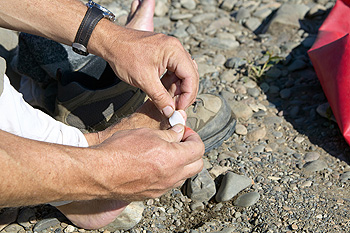 Blisters are very common, and despite being small they can be very aggravating. Blisters are even more common for people who regularly participate in physical activities. Hiking is an example of a pastime that can easily result in uncomfortable blisters, especially hiking in boots. Thankfully, there are some ways to help prevent blisters from forming. Wearing shoes that fit properly is probably the most important aspect of preventing blisters. Shoes that have been broken in are optimal because they will form around your foot naturally. Always wear socks, but preferably not cotton socks because cotton holds moisture close to the skin. Moisture helps blisters thrive, so it is best to keep your feet dry. Supportive insoles are also useful because they help keep your foot in place and prevent it from sliding around in your shoe. If you have a blister or would like more information on how to prevent blisters, speak with a podiatrist.
Blisters are very common, and despite being small they can be very aggravating. Blisters are even more common for people who regularly participate in physical activities. Hiking is an example of a pastime that can easily result in uncomfortable blisters, especially hiking in boots. Thankfully, there are some ways to help prevent blisters from forming. Wearing shoes that fit properly is probably the most important aspect of preventing blisters. Shoes that have been broken in are optimal because they will form around your foot naturally. Always wear socks, but preferably not cotton socks because cotton holds moisture close to the skin. Moisture helps blisters thrive, so it is best to keep your feet dry. Supportive insoles are also useful because they help keep your foot in place and prevent it from sliding around in your shoe. If you have a blister or would like more information on how to prevent blisters, speak with a podiatrist.
Blisters are prone to making everyday activities extremely uncomfortable. If your feet are hurting, contact Dr. Steven Schwartz of Pennsylvania. Our doctor can provide the care you need to keep you pain-free and on your feet.
Foot Blisters
Foot blisters develop as a result of constantly wearing tight or ill-fitting footwear. This happens due to the constant rubbing from the shoe, which can often lead to pain.
What Are Foot Blisters?
A foot blister is a small fluid-filled pocket that forms on the upper-most layer of the skin. Blisters are filled with clear fluid and can lead to blood drainage or pus if the area becomes infected.
How Do Blisters Form?
Blisters on the feet are often the result of constant friction of skin and material, usually by shoe rubbing. Walking in sandals, boots, or shoes that don’t fit properly for long periods of time can result in a blister. Having consistent foot moisture and humidity can easily lead to blister formation.
Prevention & Treatment
It is important to properly care for the affected area in order to prevent infection and ease the pain. Do not lance the blister and use a Band-Aid to provide pain relief. Also, be sure to keep your feet dry and wear proper fitting shoes. If you see blood or pus in a blister, seek assistance from a podiatrist.
If you have any questions, please feel free to contact our offices located in Chambersburg, and Mcconnellsburg, PA . We offer the newest diagnostic and treatment technologies for all your foot care needs.
What Is Athlete’s Foot?
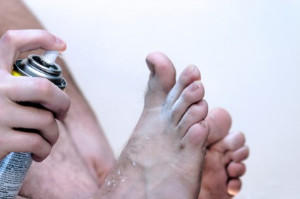 The condition that is referred to as athlete’s foot is known to be an infection of the skin on the feet. It is caused by a fungus, and symptoms may generally include red and itchy feet, especially in between the toes.This contagious fungus can be found in public areas, which may include pools, shower room floors, or locker rooms. Preventive measures that can be implemented may include keeping the feet dry by changing socks and shoes daily, and wearing appropriate shoes while in public areas. If you feel you may have athlete’s foot, it is advised to seek the counsel of a podiatrist who can guide you to begin the correct treatment.
The condition that is referred to as athlete’s foot is known to be an infection of the skin on the feet. It is caused by a fungus, and symptoms may generally include red and itchy feet, especially in between the toes.This contagious fungus can be found in public areas, which may include pools, shower room floors, or locker rooms. Preventive measures that can be implemented may include keeping the feet dry by changing socks and shoes daily, and wearing appropriate shoes while in public areas. If you feel you may have athlete’s foot, it is advised to seek the counsel of a podiatrist who can guide you to begin the correct treatment.
Athlete’s Foot
Athlete’s foot is often an uncomfortable condition to experience. Thankfully, podiatrists specialize in treating athlete’s foot and offer the best treatment options. If you have any questions about athlete’s foot, consult with Dr. Steven Schwartz from Pennsylvania. Our doctor will assess your condition and provide you with quality treatment.
What Is Athlete’s Foot?
Tinea pedis, more commonly known as athlete’s foot, is a non-serious and common fungal infection of the foot. Athlete’s foot is contagious and can be contracted by touching someone who has it or infected surfaces. The most common places contaminated by it are public showers, locker rooms, and swimming pools. Once contracted, it grows on feet that are left inside moist, dark, and warm shoes and socks.
Prevention
The most effective ways to prevent athlete’s foot include:
- Thoroughly washing and drying feet
- Avoid going barefoot in locker rooms and public showers
- Using shower shoes in public showers
- Wearing socks that allow the feet to breathe
- Changing socks and shoes frequently if you sweat a lot
Symptoms
Athlete’s foot initially occurs as a rash between the toes. However, if left undiagnosed, it can spread to the sides and bottom of the feet, toenails, and if touched by hand, the hands themselves. Symptoms include:
- Redness
- Burning
- Itching
- Scaly and peeling skin
Diagnosis and Treatment
Diagnosis is quick and easy. Skin samples will be taken and either viewed under a microscope or sent to a lab for testing. Sometimes, a podiatrist can diagnose it based on simply looking at it. Once confirmed, treatment options include oral and topical antifungal medications.
If you have any questions, please feel free to contact our offices located in Chambersburg, and Mcconnellsburg, PA . We offer the newest diagnostic and treatment technologies for all your foot care needs.
Causes of Hammertoes
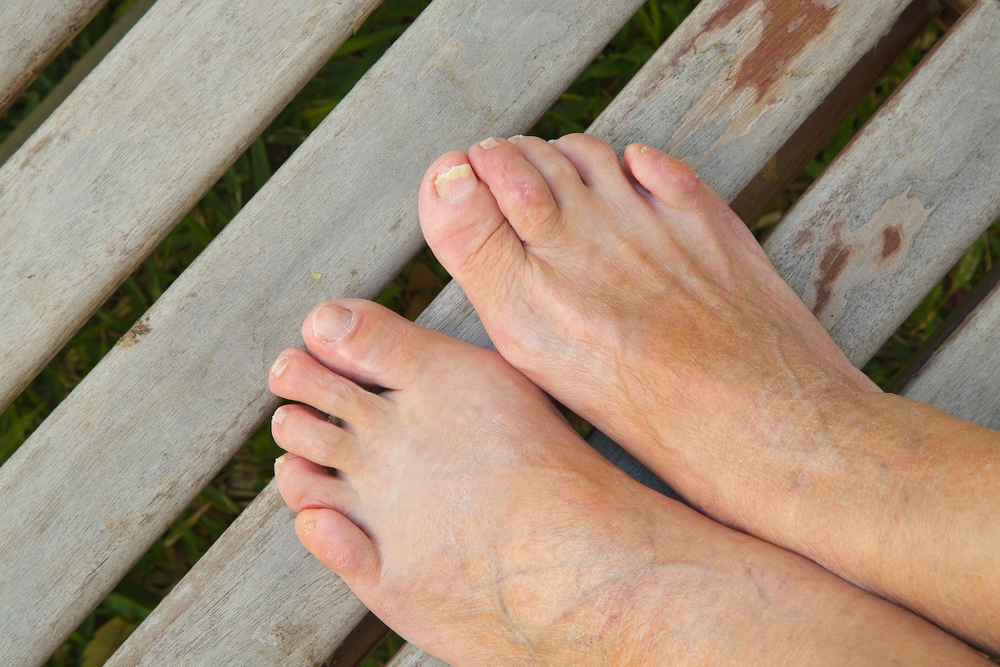 Hammertoes are a common condition that occur when one of the toe muscles becomes weak, therefore putting pressure on the toe’s tendons and joints. This pressure can cause the toe to change shape and become deformed. Usually, corns or calluses grow on the affected toe, which can cause pain when it rubs against footwear. Some hammertoes are hereditary, the foot type given to you by your parents could easily affect the growth of a hammertoe. Both flat flexible feet and high arched feet are susceptible to hammertoes. Narrow high-heeled shoes also put you at a higher risk for getting a hammertoe, because the toes are under extreme pressure with little support. Other medical complications may also contribute to the growth of a hammertoe. For example, people with diabetes have a higher chance of developing hammertoes, because they have poor blood flow in their feet. If you have a hammertoe that is causing you discomfort, it is recommended you speak with a podiatrist in order to receive the proper treatment.
Hammertoes are a common condition that occur when one of the toe muscles becomes weak, therefore putting pressure on the toe’s tendons and joints. This pressure can cause the toe to change shape and become deformed. Usually, corns or calluses grow on the affected toe, which can cause pain when it rubs against footwear. Some hammertoes are hereditary, the foot type given to you by your parents could easily affect the growth of a hammertoe. Both flat flexible feet and high arched feet are susceptible to hammertoes. Narrow high-heeled shoes also put you at a higher risk for getting a hammertoe, because the toes are under extreme pressure with little support. Other medical complications may also contribute to the growth of a hammertoe. For example, people with diabetes have a higher chance of developing hammertoes, because they have poor blood flow in their feet. If you have a hammertoe that is causing you discomfort, it is recommended you speak with a podiatrist in order to receive the proper treatment.
Hammertoe
Hammertoes can be a painful condition to live with. For more information, contact Dr. Steven Schwartz from Pennsylvania. Our doctor will answer any of your foot- and ankle-related questions.
Hammertoe is a foot deformity that affects the joints of the second, third, fourth, or fifth toes of your feet. It is a painful foot condition in which these toes curl and arch up, which can often lead to pain when wearing footwear.
Symptoms
- Pain in the affected toes
- Development of corns or calluses due to friction
- Inflammation
- Redness
- Contracture of the toes
Causes
Genetics – People who are genetically predisposed to hammertoe are often more susceptible
Arthritis – Because arthritis affects the joints in your toes, further deformities stemming from arthritis can occur
Trauma – Direct trauma to the toes could potentially lead to hammertoe
Ill-fitting shoes – Undue pressure on the front of the toes from ill-fitting shoes can potentially lead to the development of hammertoe
Treatment
Orthotics – Custom made inserts can be used to help relieve pressure placed on the toes and therefore relieve some of the pain associated with it
Medications – Oral medications such as anti-inflammatories or NSAIDs could be used to treat the pain and inflammation hammertoes causes. Injections of corticosteroids are also sometimes used
Surgery – In more severe cases where the hammertoes have become more rigid, foot surgery is a potential option
If you have any questions please contact our offices located in Chambersburg, and Mcconnellsburg, PA . We offer the newest diagnostic and treatment technologies for all your foot and ankle needs.
What Occurs If You Have Tarsal Tunnel Syndrome
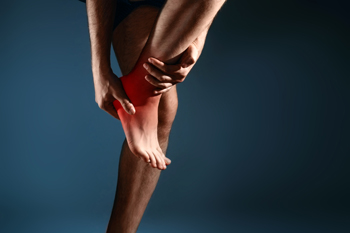 Most people have heard of carpal tunnel syndrome, but not many are familiar with tarsal tunnel syndrome. Tarsal tunnel syndrome is the ankle’s equivalent to carpal tunnel syndrome. Both syndromes involve the trapping of a nerve. When tarsal tunnel syndrome occurs, the nerve stemming from the ankle to the foot becomes entrapped in a tunnel of bones and ligaments. This creates a pressure that sends sharp burning pain into the sole of the foot. Coupling over the counter pain medications, cushioning pads for arch support and abstaining from any activity that results in pain, can be used to lessen the pain initially. If the pain lasts for more than six weeks, then it is time to consult a podiatrist, so they can properly treat the condition.
Most people have heard of carpal tunnel syndrome, but not many are familiar with tarsal tunnel syndrome. Tarsal tunnel syndrome is the ankle’s equivalent to carpal tunnel syndrome. Both syndromes involve the trapping of a nerve. When tarsal tunnel syndrome occurs, the nerve stemming from the ankle to the foot becomes entrapped in a tunnel of bones and ligaments. This creates a pressure that sends sharp burning pain into the sole of the foot. Coupling over the counter pain medications, cushioning pads for arch support and abstaining from any activity that results in pain, can be used to lessen the pain initially. If the pain lasts for more than six weeks, then it is time to consult a podiatrist, so they can properly treat the condition.
Tarsal tunnel syndrome can be very uncomfortable to live with. If you are experiencing tarsal tunnel syndrome, contact Dr. Steven Schwartz of Pennsylvania. Our doctor can provide the care you need to keep you pain-free and on your feet.
Tarsal Tunnel Syndrome
Tarsal tunnel syndrome, which can also be called tibial nerve dysfunction, is an uncommon condition of misfiring peripheral nerves in the foot. The tibial nerve is the peripheral nerve in the leg responsible for sensation and movement of the foot and calf muscles. In tarsal tunnel syndrome, the tibial nerve is damaged, causing problems with movement and feeling in the foot of the affected leg.
Common Cause of Tarsal Tunnel Syndrome
- Involves pressure or an injury, direct pressure on the tibial nerve for an extended period of time, sometimes caused by other body structures close by or near the knee.
- Diseases that damage nerves, including diabetes, may cause tarsal tunnel syndrome.
- At times, tarsal tunnel syndrome can appear without an obvious cause in some cases.
The Effects of Tarsal Tunnel Syndrome
- Different sensations, an afflicted person may experience pain, tingling, burning or other unusual sensations in the foot of the affected leg.
- The foot muscles, toes and ankle become weaker, and curling your toes or flexing your foot can become difficult.
- If condition worsens, infections and ulcers may develop on the foot that is experiencing the syndrome.
A physical exam of the leg can help identify the presence of tarsal tunnel syndrome. Medical tests, such as a nerve biopsy, are also used to diagnose the condition. Patients may receive physical therapy and prescriptive medication. In extreme cases, some may require surgery.
If you have any questions please feel free to contact our offices located in Chambersburg, and Mcconnellsburg, PA . We offer the newest diagnostic and treatment technologies for all your foot and ankle needs.
Barefoot Running vs Running with Shoes
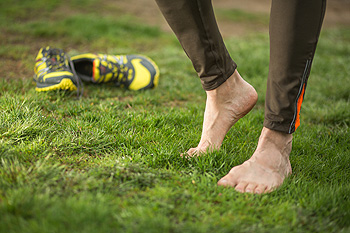 Barefoot running has become a trend in recent years. Many runners feel that they benefit from going shoeless and that shoes impede on their natural state. So what are the actual differences between running barefoot and running with shoes on? One of the main differences is how your foot hits the ground. Runners’ shoes usually hit the ground with their heels first, which creates a force up to three times the body’s weight. This amount of force can lead to certain injuries; two examples of these injuries are Achilles tendinitis and stress fractures. Barefoot runners strike the ground with the balls of their feet, which results in less force upon impact. Also, barefoot runners naturally shorten their strides, therefore reducing the force on their lower bodies. This reduced force automatically flexes joints, which creates a softer landing on hard surfaces. Shoes offer support that has made the muscles in feet move differently, because they don’t have to work as hard. Without shoes, your calves and feet will have to work harder to accommodate for the change in landing and your stride, but your body will be more attuned to your natural stride. If you are thinking about going barefoot while running, it is recommended that you consult a podiatrist first, especially if you have a history of foot problems.
Barefoot running has become a trend in recent years. Many runners feel that they benefit from going shoeless and that shoes impede on their natural state. So what are the actual differences between running barefoot and running with shoes on? One of the main differences is how your foot hits the ground. Runners’ shoes usually hit the ground with their heels first, which creates a force up to three times the body’s weight. This amount of force can lead to certain injuries; two examples of these injuries are Achilles tendinitis and stress fractures. Barefoot runners strike the ground with the balls of their feet, which results in less force upon impact. Also, barefoot runners naturally shorten their strides, therefore reducing the force on their lower bodies. This reduced force automatically flexes joints, which creates a softer landing on hard surfaces. Shoes offer support that has made the muscles in feet move differently, because they don’t have to work as hard. Without shoes, your calves and feet will have to work harder to accommodate for the change in landing and your stride, but your body will be more attuned to your natural stride. If you are thinking about going barefoot while running, it is recommended that you consult a podiatrist first, especially if you have a history of foot problems.
Barefoot Running
Many people have decided to start barefoot running for a variety of reasons. Some claim that the technique improves foot biomechanics while also reducing injury risk. If you are interested in running barefoot, consult with Dr. Steven Schwartz from Pennsylvania. Our doctor will assess your condition and provide you with quality advice and whether barefoot running is right for you.
Running Barefoot vs. Running in Shoes
While running shoes provide excellent support and protection to our feet, they can negatively impact the way we run. Those who run in shoes have been found to be more likely hit the ground with their heels first. This running style has been found to increase the risk of injury from ankle sprains, stress fractures, and Achilles tendinitis. Those who run barefoot tend to land on the balls of their feet which generates less impact.
Benefits of Running Barefoot
Some reported benefits of running barefoot include:
- Less impact on the feet
- Increased sensation and feedback from the feet
- Increased efficiency from less weight from shoes
- Potential for less injury from footwear
- Reported increases in strength to foot and leg muscles
- Developing a natural gait
- Improving balance and proprioception
Downsides to Running Barefoot
- Less protection from debris on the ground
- Increased risk of contracting bacterial or fungal infection
- Potential for injuries from overuse
- Blisters
Those with diabetes should avoid barefoot running at all costs. This is due to the risk of sustaining a wound that could become infected. If you do decide to run barefoot, inspect the area you are running in for lots of debris. Furthermore, it is best to start off slow and to not push yourself too hard the first time out, even if you run in shoes regularly. Another substitute for running shoes are minimalist shoes which reduce the weight of shoes but provide better protection.
If you have any questions, please feel free to contact our offices located in Chambersburg, and Mcconnellsburg, PA . We offer the newest diagnostic and treatment technologies for all your foot care needs.
Where Do Stress Fractures Occur?
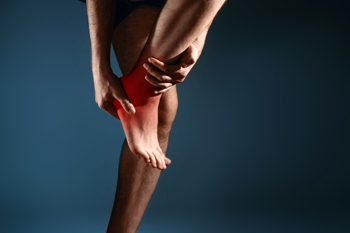 If running and jumping are frequent activities that you participate in, you may experience stress fractures in your feet. It may typically occur as a result of repeated impact the feet endure and will appear as tiny cracks in the bone. The bones in the feet absorb the weight of the body, and this type of fracture is most likely to appear in the lower extremities. Stress fractures may happen to individuals who suddenly increase the intensity or change the type of sport they are engaging in, in addition to having certain medical conditions that may include osteoporosis, which can weaken the bones. There are several symptoms that are associated with this condition, including severe pain and discomfort, swelling, or possible bruising. Research has shown there may be methods than can be implemented, which may prevent a stress fracture from occurring. These may include ingesting a diet that is rich in calcium, which may aid in strengthening the bones, gradually increasing the power of your workout or chosen sport, in addition to wearing shoes that fit correctly. After a proper diagnosis is performed, which will typically include having an X-ray or MRI performed, recovery may begin. If you feel you may have endured a stress fracture, it is suggested to consult with a podiatrist, to discuss correct treatment options.
If running and jumping are frequent activities that you participate in, you may experience stress fractures in your feet. It may typically occur as a result of repeated impact the feet endure and will appear as tiny cracks in the bone. The bones in the feet absorb the weight of the body, and this type of fracture is most likely to appear in the lower extremities. Stress fractures may happen to individuals who suddenly increase the intensity or change the type of sport they are engaging in, in addition to having certain medical conditions that may include osteoporosis, which can weaken the bones. There are several symptoms that are associated with this condition, including severe pain and discomfort, swelling, or possible bruising. Research has shown there may be methods than can be implemented, which may prevent a stress fracture from occurring. These may include ingesting a diet that is rich in calcium, which may aid in strengthening the bones, gradually increasing the power of your workout or chosen sport, in addition to wearing shoes that fit correctly. After a proper diagnosis is performed, which will typically include having an X-ray or MRI performed, recovery may begin. If you feel you may have endured a stress fracture, it is suggested to consult with a podiatrist, to discuss correct treatment options.
Stress fractures occur when there is a tiny crack within a bone. To learn more, contact Dr. Steven Schwartz from Pennsylvania. Our doctor can provide the care you need to keep you pain free and on your feet.
How Are They Caused?
Stress fractures are the result of repetitive force being placed on the bone. Since the lower leg and feet often carry most of the body’s weight, stress fractures are likely to occur in these areas. If you rush into a new exercise, you are more likely to develop a stress fracture since you are starting too much, too soon. Pain resulting from stress fractures may go unnoticed at first, however it may start to worsen over time.
Risk Factors
- Gender – They are more commonly found in women compared to men.
- Foot Problems – People with unusual arches in their feet are more likely to develop stress fractures.
- Certain Sports – Dancers, gymnasts, tennis players, runners, and basketball players are more likely to develop stress fractures.
- Lack of Nutrients – A lack of vitamin D and calcium may weaken the bones and make you more prone to stress fractures
- Weak Bones – Osteoporosis can weaken the bones therefore resulting in stress fractures
Stress fractures do not always heal properly, so it is important that you seek help from a podiatrist if you suspect you may have one. Ignoring your stress fracture may cause it to worsen, and you may develop chronic pain as well as additional fractures.
If you have any questions, please feel free to contact our offices located in Chambersburg, and Mcconnellsburg, PA . We offer the newest diagnostic and treatment technologies for all your foot care needs.

